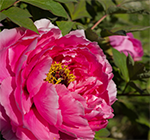LANDSCAPE AND GARDEN IDEAS IN/FOR FLORIDA-LOOKING FOR IDEAS AROUND THE WORLD
A crumbled garden
“To know Venice’s flora you must walk with your nose up. Plants
seem to be forced to
live like pigeons”
(Alessandro Marcello)
Can a whole city be called a garden? ICOMOS-IFLA, in the Florence Charter in December 1981, gave a definition of a historical garden as “(…) an architectural and horticultural composition of interest to the public from the historical or artistic point of view. As such, it is to be considered as a monument”.
Perfect examples of such a garden are surely
Villa
d’Este, Villa Lante at Bagnaia, Versailles. But Venice? Built on 118
small islands, after thousands of years of colonization, very few pieces
of land have survived human greed or the necessity of dwelling.
Amazing dwellings, by the way. Every square foot of any building in
Venice tells a story and is a witness to centuries of grandeur of the
city. In this meaning it is wholly, for sure, a monument.
But, when you walk about surrounded by all this architectural magnificence, if you sometimes raise your head, you’ll notice that, even with such little space, nature is still present in the city. It is rarely a garden – usually a small, secret garden squeezed between buildings or hidden by a tall wall and you can see only a pinch of greenery, the branch of a tree or a climbing rose peeping out from behind a rusty gate.
At
the end of the XVI century there were more than 200 gardens in the city
and on the largest islands. Made for patricians, protected by tall
walls, filled up with marble sculptures, fountains and rare plants, they
were famous for their extraordinary beauty.
Nowadays,
unfortunately, only few of them have survived. The most interesting and
best known are medieval cloisters and vegetable gardens, palazzo gardens
(gardens of aristocratic villas), contemporary gardens and vegetable
gardens on the biggest islands.
Generally they were/are in
raised beds to defend the roots against salt water during floods, with a
paved courtyard surrounding a central well for collecting water. These
gardens very often hosted rare plants and herbs from the Orient.
Strolling around by Venice’s canals more often you can see a terrace in
a sumptuous Ca’, or a typical altana, up on the roof to have access to
fresh air and sunshine, especially in the past during hot Italian
summers.
Other times you can just see only a couple of pots hanging from small balconies or a simple “weed” winning a place on a building. Roses, pelargoniums, climbing false jasmine, wisteria, vines, a potted lime tree and all the perseverance and love that can make them grow in tiny pots on tiny balconies.
But, just because those spaces are so rare they are probably even more precious than any other typical garden. It is a garden made up of fragments, a garden than seems to have crumbled away a long time ago but is still there, immersed and nestling into Venetian architecture.



























